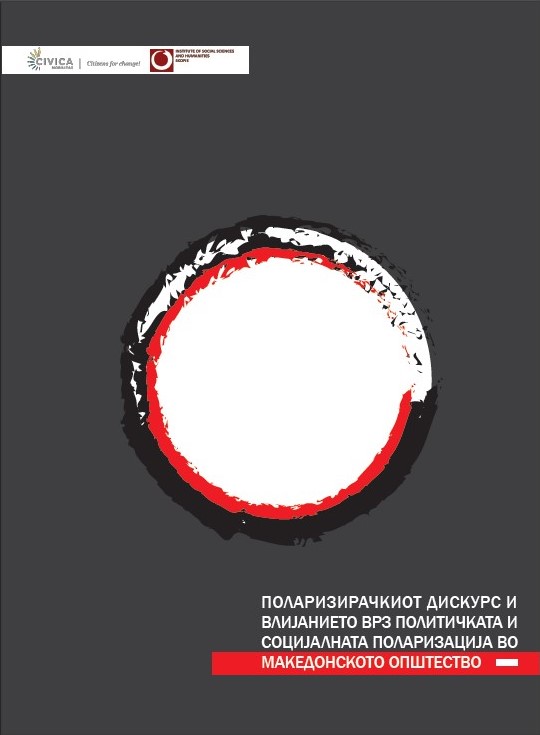
We kindly inform you that, as long as the subject affiliation of our 300.000+ articles is in progress, you might get unsufficient or no results on your third level or second level search. In this case, please broaden your search criteria.

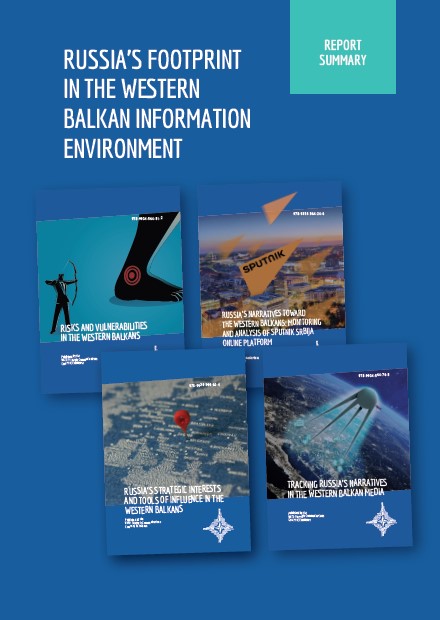
This is a summary of four reports published by the NATO Strategic Communications Centre of Excellence in the framework of project “Russia’s Footprint in the Western Balkan Information Environment”. You can read full reports by clicking on links or visiting www.stratcomcoe.org: Russia’s Strategic Interests and Tools of Influence in the Western Balkans; Risks and Vulnerabilities in the Western Balkans; Russia’s Narratives toward Western Balkans: Analysis of Sputnik Srbija; Tracking Russia’s Narratives in the Western Balkan Media; The project investigates Russia’s tools of influence in the Western Balkans (WB), with a focus on the media landscape. The scope of analysis is Russia’s activities in Albania, Bosnia and Herzegovina, Kosovo, North Macedonia, Montenegro and Serbia. The project analyses Russia’s interests and influence toolbox, as well as identifies the vulnerabilities that make the Western Balkan countries susceptible to hostile influence. It also identifies the Kremlin’s narratives in the WB as well as looks at the role of local WB media in spreading those narratives. The report provides a basis for interested stakeholders to understand the methods and means that Russia uses to influence decision-making in the Western Balkans, as well as offers insights into the regional characteristics that facilitate Russia’s influence in the WB media space.
More...
The survey was conducted on October 12-19, 2019 on a national sample of 1117 people selected from 109 urban and rural localities in all counties of Romania. He measured the confidence of the presidential candidates, the comparisons between them, the voting intentions, the problems facing the country, the attitude towards various issues, people, institutions.
More...
The research was conducted in September 2018 based on 3 focus groups in which 28 people participated. The study aimed to evaluate the perception of the Dăncilă government, the evaluation of President Klaus Iohannis, Traian Băsescu, Eugen Tomac, Ludovic Orban, Dan Barna, the perception of PMP, PNL, USR, PSD, of the topics that will be debated in the campaign for the European elections. political relations, attitude towards the PMP, intention to vote for referendums on issues such as: no criminals in public office, the union of Moldova with Romania, electronic voting.
More...
The survey was conducted on August 1-4, 2020 by interviewing 502 people living in the commune. He measured the way in which the City Hall managed a series of issues, the priorities of the population, the perception of the current mayor, of the main competitors, comparisons between them, voting intentions.
More...
The survey was conducted on July 2-5, 2020 on a sample of 629 inhabitants of the city. He measured people’s opinion about the main candidates for City Hall, the comparison between the first two competitors, expectations of the future mayor, voting intentions, how the City Hall was involved in certain administrative issues, achievements and failures of current and former mayor.
More...
The survey was conducted on July 1-3, 2020 on a sample of 305 inhabitants of the city. He measured people’s opinion about central and local public administration institutions, about the main candidates for City Hall, the comparison between the first two competitors, the expectations of the future mayor, voting intentions, how the City Hall got involved in certain administrative issues, achievements and failures of the current mayor and the main opponent.
More...
The survey was conducted on June 20-25, 2020 on a sample of 550 inhabitants of the commune. He measured people’s opinion about central and local public administration institutions, about the main candidates for City Hall, about political parties, expectations of the future mayor, voting intentions, how the City Hall got involved in certain administrative issues, achievements and failures of the current mayor and of the main opponents.
More...
The survey was conducted between January 22-29, 2020 on a sample of 757 adults living in the city. He measured how the population perceives the involvement of the mayor’s office in various administrative issues, trust in local political leaders, voting intentions in local elections, the perception of local party organizations.
More...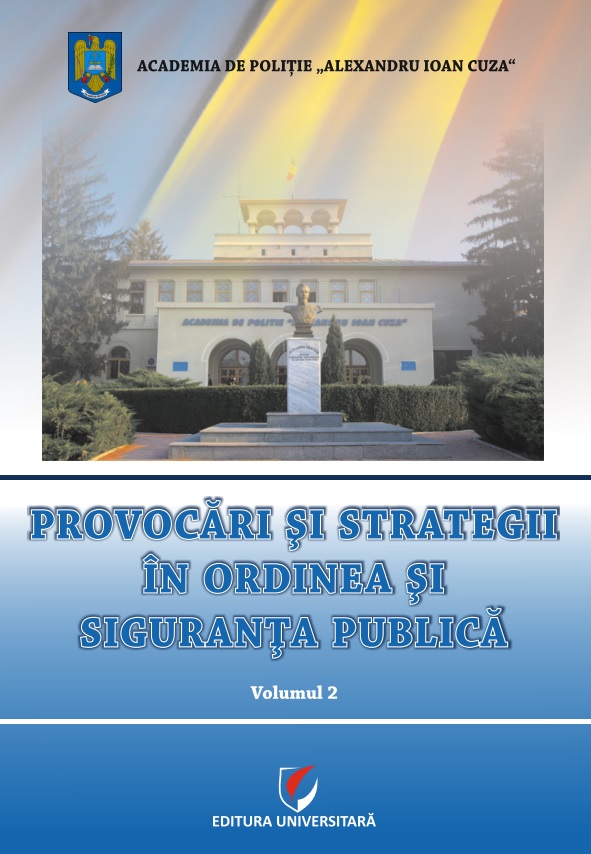
Following the military invasion by the forces of the Russian army launched on 24.02.2022 in Ukraine, at the level of its neighboring states and beyond, there was a massive influx of people displaced from this country, the groups of people being made up both from Ukrainian citizens and and from citizens of other states that, at the time of the invasion, were living in or transiting Ukraine. This aspect determined the creation of a mechanism for quick and appropriate measures both at European and national level to manage this phenomenon. At the European level, on 04.03.2023, the Council issued the Decision (EU) 2022/382 and activated the temporary protection provided by Directive 2001/55/EC regarding the minimum standards for granting temporary protection, in the event of a massive influx of displaced persons, and the measures to promote a balance between the efforts of the member states to welcome these people and bear the consequences of this reception, all displaced persons from Ukraine, who entered the territory of the EU after 24.02.2022, benefiting from this measure. At the national level, on 18.03.2022, it was issued the Government Decision no. 367 regarding the establishment of conditions for ensuring temporary protection as well as for the modification and completion of some normative acts in the field of foreigners, which regulated the granting of temporary protection on the territory of Romania. Temporary protection is an emergency mechanism that applies in the event of a massive influx of people and aims to provide immediate and collective protection. The aim is to ease pressure on national asylum systems and allow displaced people to enjoy harmonized rights across the European Union.
More...
Three weeks after the start of the war against Ukraine, the Kremlin’s political objectives have not been achieved. The resistance from the Ukrainian armed forces persists, the morale of Ukrainian society is high, and the very serious sanctions imposed by the international community on Russia are causing an economic crisis and the partial political isolation of the country. There are many indications that this situation has largely come as a surprise to the Kremlin, which has fallen victim to faulty analysis and forecasting. In this situation, the man responsible for the decision to invade, the Russian President Vladimir Putin, faces the challenge of which further tactics of action to choose. It is now difficult to predict further developments, as these will depend particularly on the level of Ukrainian resistance, the scale of Western support and the immediate effects of sanctions. Of the many possible scenarios, the most likely now seems to be that of either halting the Russian offensive once a political agreement to implement some of the Kremlin’s political demands has been reached; or continuing it for a longer period of time, leading to Russia’s seizure of significant areas (especially the south-east of Ukraine) and the destruction of key elements of its military and civil infrastructure, turning the country into a failed state.
More...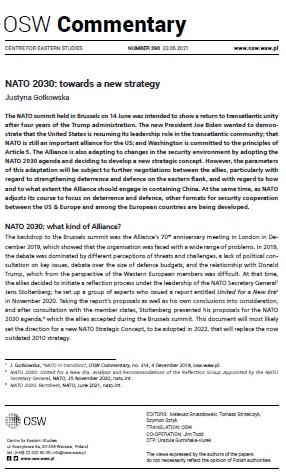
The NATO summit held in Brussels on 14 June was intended to show a return to transatlantic unity after four years of the Trump administration. The new President Joe Biden wanted to demonstrate that the United States is resuming its leadership role in the transatlantic community; that NATO is still an important alliance for the US; and Washington is committed to the principles of Article 5. The Alliance is also adapting to changes in the security environment by adopting the NATO 2030 agenda and deciding to develop a new strategic concept. However, the parameters of this adaptation will be subject to further negotiations between the allies, particularly with regard to strengthening deterrence and defence on the eastern flank, and with regard to how and to what extent the Alliance should engage in containing China. At the same time, as NATO adjusts its course to focus on deterrence and defence, other formats for security cooperation between the US & Europe and among the European countries are being developed.
More...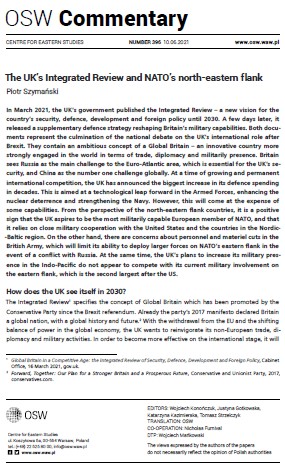
In March 2021, the UK’s government published the Integrated Review – a new vision for the country’s security, defence, development and foreign policy until 2030. A few days later, it released a supplementary defence strategy reshaping Britain’s military capabilities. Both documents represent the culmination of the national debate on the UK’s international role after Brexit. They contain an ambitious concept of a Global Britain – an innovative country more strongly engaged in the world in terms of trade, diplomacy and militarily presence. Britain sees Russia as the main challenge to the Euro-Atlantic area, which is essential for the UK’s security, and China as the number one challenge globally. At a time of growing and permanent international competition, the UK has announced the biggest increase in its defence spending in decades. This is aimed at a technological leap forward in the Armed Forces, enhancing the nuclear deterrence and strengthening the Navy. However, this will come at the expense of some capabilities. From the perspective of the north-eastern flank countries, it is a positive sign that the UK aspires to be the most militarily capable European member of NATO, and that it relies on close military cooperation with the United States and the countries in the Nordic--Baltic region. On the other hand, there are concerns about personnel and materiel cuts in the British Army, which will limit its ability to deploy larger forces on NATO’s eastern flank in the event of a conflict with Russia. At the same time, the UK’s plans to increase its military presence in the Indo-Pacific do not appear to compete with its current military involvement on the eastern flank, which is the second largest after the US.
More...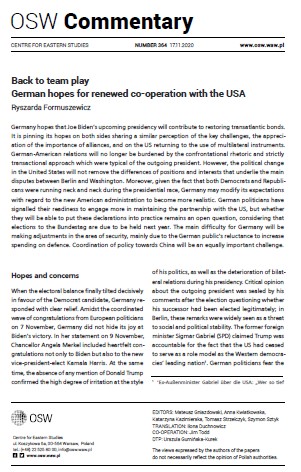
Germany hopes that Joe Biden’s upcoming presidency will contribute to restoring transatlantic bonds. It is pinning its hopes on both sides sharing a similar perception of the key challenges, the appreciation of the importance of alliances, and on the US returning to the use of multilateral instruments. German-American relations will no longer be burdened by the confrontational rhetoric and strictly transactional approach which were typical of the outgoing president. However, the political change in the United States will not remove the differences of positions and interests that underlie the main disputes between Berlin and Washington. Moreover, given the fact that both Democrats and Republicans were running neck and neck during the presidential race, Germany may modify its expectations with regard to the new American administration to become more realistic. German politicians have signalled their readiness to engage more in maintaining the partnership with the US, but whether they will be able to put these declarations into practice remains an open question, considering that elections to the Bundestag are due to be held next year. The main difficulty for Germany will be making adjustments in the area of security, mainly due to the German public’s reluctance to increase spending on defence. Coordination of policy towards China will be an equally important challenge.
More...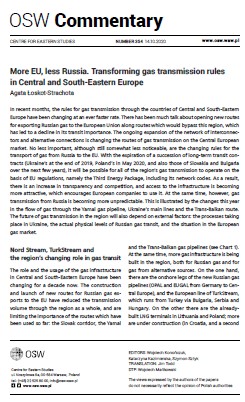
In recent months, the rules for gas transmission through the countries of Central and South-Eastern Europe have been changing at an ever faster rate. There has been much talk about opening new routes for exporting Russian gas to the European Union along routes which would bypass this region, which has led to a decline in its transit importance. The ongoing expansion of the network of interconnectors and alternative connections is changing the routes of gas transmission on the Central European market. No less important, although still somewhat less noticeable, are the changing rules for the transport of gas from Russia to the EU. With the expiration of a succession of long-term transit contracts (Ukraine’s at the end of 2019, Poland’s in May 2020, and also those of Slovakia and Bulgaria over the next few years), it will be possible for all of the region’s gas transmission to operate on the basis of EU regulations, namely the Third Energy Package, including its network codes. As a result, there is an increase in transparency and competition, and access to the infrastructure is becoming more attractive, which encourages European companies to use it. At the same time, however, gas transmission from Russia is becoming more unpredictable. This is illustrated by the changes this year in the flow of gas through the Yamal gas pipeline, Ukraine’s main lines and the Trans-Balkan route. The future of gas transmission in the region will also depend on external factors: the processes taking place in Ukraine, the actual physical levels of Russian gas transit, and the situation in the European gas market.
More...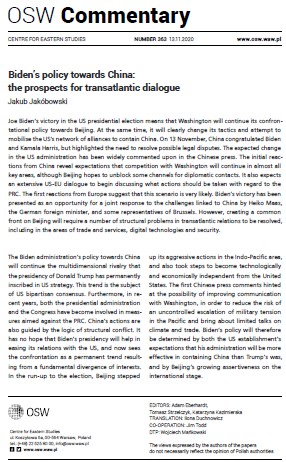
Joe Biden’s victory in the US presidential election means that Washington will continue its confrontational policy towards Beijing. At the same time, it will clearly change its tactics and attempt to mobilise the US’s network of alliances to contain China. On 13 November, China congratulated Biden and Kamala Harris, but highlighted the need to resolve possible legal disputes. The expected change in the US administration has been widely commented upon in the Chinese press. The initial reactions from China reveal expectations that competition with Washington will continue in almost all key areas, although Beijing hopes to unblock some channels for diplomatic contacts. It also expects an extensive US-EU dialogue to begin discussing what actions should be taken with regard to the PRC. The first reactions from Europe suggest that this scenario is very likely. Biden’s victory has been presented as an opportunity for a joint response to the challenges linked to China by Heiko Maas, the German foreign minister, and some representatives of Brussels. However, creating a common front on Beijing will require a number of structural problems in transatlantic relations to be resolved, including in the areas of trade and services, digital technologies and security.
More...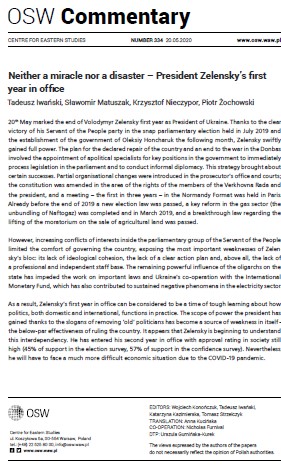
20th May marked the end of Volodymyr Zelensky first year as President of Ukraine. Thanks to the clear victory of his Servant of the People party in the snap parliamentary election held in July 2019 and the establishment of the government of Oleksiy Honcharuk the following month, Zelensky swiftly gained full power. The plan for the declared repair of the country and an end to the war in the Donbas involved the appointment of apolitical specialists for key positions in the government to immediately process legislation in the parliament and to conduct informal diplomacy. This strategy brought about certain successes. Partial organisational changes were introduced in the prosecutor’s office and courts; the constitution was amended in the area of the rights of the members of the Verkhovna Rada and the president, and a meeting – the first in three years – in the Normandy Format was held in Paris. Already before the end of 2019 a new election law was passed, a key reform in the gas sector (the unbundling of Naftogaz) was completed and in March 2019, and a breakthrough law regarding the lifting of the moratorium on the sale of agricultural land was passed.
More...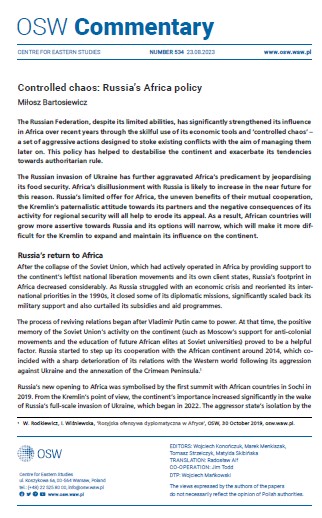
The Russian Federation, despite its limited abilities, has significantly strengthened its influence in Africa over recent years through the skillful use of its economic tools and ‘controlled chaos’ –a set of aggressive actions designed to stoke existing conflicts with the aim of managing them later on. This policy has helped to destabilize the continent and exacerbate its tendencies towards authoritarian rule. The Russian invasion of Ukraine has further aggravated Africa’s predicament by jeopardising its food security. Africa’s disillusionment with Russia is likely to increase in the near future for this reason. Russia’s limited offer for Africa, the uneven benefits of their mutual cooperation, the Kremlin’s paternalistic attitude towards its partners and the negative consequences of its activity for regional security will all help to erode its appeal. As a result, African countries will grow more assertive towards Russia and its options will narrow, which will make it more difficult for the Kremlin to expand and maintain its influence on the continent.
More...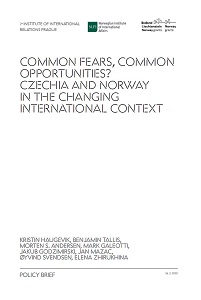
“Every change of scene requires new expositions, descriptions, explanations,” Milan Kundera once observed. With long-dominant structures in flux, European states – and perhaps smaller ones in particular – are now forced to rethink their foreign policy approaches and practices. While the changing international context has generally created anxiety and uncertainty, fear can also have productive effects. It can create opportunities – and incentives – for re-assessing as well as for diversifying and intensifying support networks and reaching out to new partners.
More...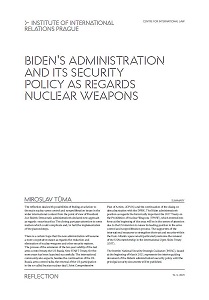
The reflection deals with possibilities of finding at solution to the main nuclear arms control and nonproliferation issues in the wider international context from the point of view of President Joe Biden's Democratic administration's declared new approach as regards security policy. The closing part pays attention to some matters which could complicate and/or halt the implementation of the planned steps. There is a certain hope that the new administration will assume a more cooperative stance as regards the reduction and elimination of nuclear weapons and other security matters. The process of the extension of the ten-year validity of the last arms control treaty, the US-Russia New START Treaty, for five more years has been launched successfully. The international community also expects, besides the continuation of the US-Russia arms control talks, the renewal of the US participation in the so-called Iranian nuclear deal (Joint Comprehensive Plan of Action, JCPOA) and the continuation of the dialog on denuclearization with the DPRK. The Biden administration's position as regards the historically important the 2017 Treaty on the Prohibition of Nuclear Weapons (TPNW), which entered into force at the beginning of this year, will be in the centre of attention due to the US intention to renew its leading position in the arms control and nonproliferation process. The supporters of the international measures to strengthen the trust and security within the Euro-Atlantic space would particularly welcome the renewal of the USA's membership in the international Open Skies Treaty (OST).
More...